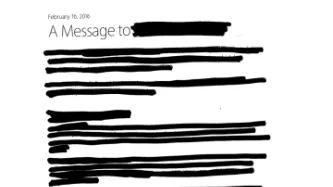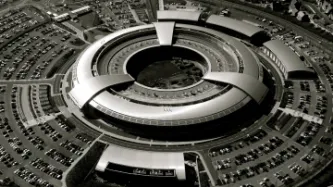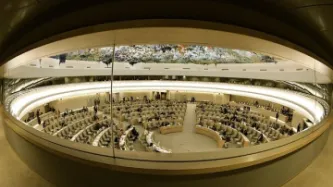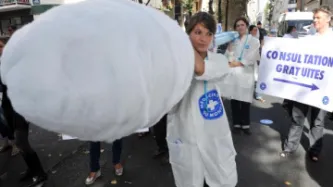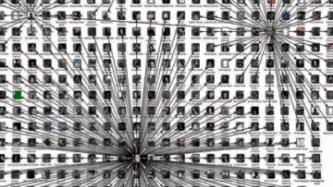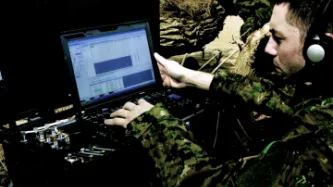Search
Content type: Examples
The 20 years since the 9/11 attacks have fundamentally changed the way the New York Police Department operates, leading it to use facial recognition software, licence plate readers, and mobile X-ray vans, among other surveillance tools for both detecting and blocking potential terrorist attacks and solving minor crimes. Surveillance drones monitor mass protests, antiterrorism officers interrogate protesters, and the NYPD’s Intelligence Division uses antiterror tactics against gang violence and…
Content type: Examples
US Customs and Border Protection Data show that the Department of Homeland Security deployed helicopters, airplanes, and drones over 15 cities, including New York City, Buffalo, Dayton OH, and Philadelphia, where demonstrators assembled to protest the killing of George Floyd and collected at least 270 hours of video surveillance footage. That deployment, which sparked a congressional inquiry, was only part of a nationwide operation that repurposed resources usually sent to the US border to find…
Content type: Examples
According to records obtained under a freedom of information request, the San Francisco Police Department used the camera network belonging to downtown Union Square Improvement District to spy on protesters during the end of May and early June 2020. The high-definition cameras, manufactured by Motorola brand Avigilon, can zoom in on a person's face and are linked to a software analysis system. Motorola is expanding its tool lineup to make it easier for police to gain access to private cameras…
Content type: Examples
Over 2020, EFF supported the right to protest without being surveilled by bringing lawsuits, offering protesters legal support, teaching protesters surveillance self-defence, and providing tools for people on the ground to use to determine what equipment their local police departments are using to spy on activists. Via public records requests, EFF discovered that the San Francisco Police Department gained access to over 400 cameras belonging to the Union Square Business Improvement District to…
Content type: Examples
When Dallas police posted on Twitter asking for videos of the protests taking place after George Floyd's killing, a flood of videos and images of K-pop stars were uploaded to its anonymous iWatch Dallas tip-off app. Law enforcement can call on vast numbers of networked cameras - from cars, food and retail chains that are typically willing to share with police, law enforcement agencies' own networks of surveillance and body cameras as well as object and face recognition software, protesters and…
Content type: Examples
Despite having promised in 2016 not to facilitate domestic surveillance, the AI startup Dataminr used its firehose access to Twitter to alert law enforcement to social media posts with the latest whereabouts and actions of demonstrators involved in the protests following the killing of George Floyd. Dataminr's investors include the CIA and, previously, Twitter itself. Twitter's terms of service ban software developers from tracking or monitoring protest events. Some alerts were sourced from…
Content type: Examples
New data emerged in January 2021 to show that the National Guard deployment of more than 43,350 troops during the nationwide demonstrations following the killing of George Floyd was far more extensive than had been realised, and far greater than the 6,200 troops deployed at the Capitol during the forewarned insurrection. At least 20 military surveillance and reconnaissance helicopters flew over protests in Philadelphia, Minneapolis, Atlanta, and Washington DC, raising concerns about the data…
Content type: Examples
Hundreds of emails and documents obtained in response to a freedom of information request by BuzzFeed News show that US federal agents monitored social media for information on planned Black Lives Matter demonstrations in Minneapolis, Washington DC, Los Angeles, and other cities. Researchers and activists (such as EFF) warned that technology-driven surveillance of protesters could set a dangerous precedent and chill assembly and speech, particularly in the case of Black Lives Matter. The…
Content type: Examples
Human rights activists and Democratic members of the US Congress wrote to top law enforcement officials in the Trump administration to demand they cease surveilling Americans engaging in peaceful protests. Trump and others in his administration called those protesting the killing of George Floyd "domestic terrorists" and "anarchists". Recent efforts to surveil Americans have included facial recognition, automated licence plate readers, and Stingrays, as well as spy planes and drones.
https://…
Content type: Examples
During the Black Lives Matter protests of summer 2020, US police took advantage of a lack of regulation and new technologies to expand the scope of people and platforms they monitor; details typically emerge through lawsuits, public records disclosures, and stories released by police department PR as crime prevention successes. A report from the Brennan Center for Justice highlights New York Police Department threats to privacy, freedom of expression, and due process and the use of a predator…
Content type: Examples
The whistleblower said they were unable to find any legitimate reason for the high volume of the requests for location information. “There is no other explanation, no other technical reason to do this. Saudi Arabia is weaponising mobile technologies,” the whistleblower claimed.
The data leaked by the whistleblower was also seen by telecommunications and security experts, who confirmed they too believed it was indicative of a surveillance campaign by Saudi Arabia.
The data shows requests for…
Content type: News & Analysis
Simply put, the National Security Agency is an intelligence agency. Its purpose is to monitor the world's communications, which it traditionally collected by using spy satellites, taps on cables, and placing listening stations around the world.
In 2008, by making changes to U.S. law, the U.S. Congress enabled the NSA to make U.S. industry complicit in its mission. No longer would the NSA have to rely only on international gathering points. It can now go to domestic companies who hold massive…
Content type: News & Analysis
On a hot day in Nairobi, our researcher is speaking to an officer of Kenya’s National Intelligence Service (NIS). The afternoon is wearing on and the conversation has turned to the presidential elections, taking place in August this year. He has just finished describing the NIS’ highly secret surveillance powers and the disturbing ways in which these powers are deployed.
“It is what you might call ‘acceptable deaths,’” he states about the misuse of communications surveillance powers. “People…
Content type: Long Read
This piece was written by Ashley Gorski, who is an attorney at the American Civil Liberties Union, and PI legal officer Scarlet Kim and originally appeared in The Guardian here.
In recent weeks, the Hollywood film about Edward Snowden and the movement to pardon the NSA whistleblower have renewed worldwide attention on the scope and substance of government surveillance programs. In the United States, however, the debate has often been a narrow one, focused on the…
Content type: Long Read
This week, Privacy International, together with nine other international human rights NGOs, filed submissions with the European Court of Human Rights. Our case challenges the UK government’s bulk interception of internet traffic transiting fiber optic cables landing in the UK and its access to information similarly intercepted in bulk by the US government, which were revealed by the Snowden disclosures. To accompany our filing, we have produced two infographics to illustrate the…
Content type: Press release
Key points
Privacy International, Liberty, Amnesty International, and seven other human rights organizations challenge UK mass surveillance and UK access to US mass surveillance at the European Court of Human Rights
This is the first case before the European Court of Human Rights to directly challenge UK and US mass surveillance revealed by the Snowden disclosures
National courts and oversight bodies have failed to rein in mass surveillance practices that impact hundreds of millions of…
Content type: News & Analysis
When it comes to tackling corruption, we need to critically engage with the role of technology. One technology in particular is biometrics, a technology that identifies and stores on a database the identity of an individual through some physical characteristic, usually fingerprints or an iris scan. Biometrics is increasingly being used in ID and voter registration schemes. It is a technology that raises privacy and data protection issues but notwithstanding…
Content type: News & Analysis
We already know that in some countries, like the UK, governments are drafting laws to legalise and legitimise their incredible surveillance powers. In the U.S. we are seeing legislation that is using remarkably similar language on encryption and surveillance. The next phase of the cryptowars has openly begun.
Yesterday what is being called the Feinstein-Burr decryption Bill was introduced into the US Senate and leaked online. Whilst the short title ‘Compliance with Court Orders…
Content type: News & Analysis
On Tuesday (16th February 2016) Apple posted a message to their customers stating that the company had been ordered by the FBI to “make a new version of the iPhone operating system, circumventing several important security features, and install it on an iPhone recovered during the investigation.” Apple are currently opposing this order. A fascinating debate is currently playing out in the media about whether Apple should comply with or resist the FBI's demands.
Whatever…
Content type: Press release
Governments must accept they have lost the debate over the legitimacy of mass surveillance and reform their oversight of intelligence gathering, Privacy International and Amnesty International said today in a briefing published two years after Edward Snowden blew the lid on US and UK intelligence agencies’ international spying network.
“The balance of power is beginning to shift,” said Edward Snowden in an article published today in newspapers around the world. “With each court victory,…
Content type: Press release
British intelligence services acted unlawfully in accessing millions of people’s personal communications collected by the NSA, the Investigatory Powers Tribunal ruled today. The decision marks the first time that the Tribunal, the only UK court empowered to oversee GHCQ, MI5 and MI6, has ever ruled against the intelligence and security services in its 15 year history.
The Tribunal declared that intelligence sharing between the United States and the…
Content type: Long Read
Modern day government surveillance is based on the simple concept of “more is more” and “bigger is better”. More emails, more text messages, more phone calls, more screenshots from Skype calls. The bigger the haystack, the more needles we can find.
Thanks to Edward Snowden, we know that this fundamental idea drives intelligence agencies like the NSA and GCHQ - the desire to collect it all, to generate gigantic haystacks through which to trawl. In the almost two years since the first of Snowden…
Content type: Long Read
Many people imagine intelligence sharing to be a practice whereby men in trench coats silently slide manilla envelopes containing anonymous tip-offs or intelligence reports marked TOP SECRET across tables in smoke-filled rooms.
While such practices certainly exist, they represent only a tiny slice of intelligence sharing activities, and are vastly overshadowed by the massive exchange of bulk unanlysed (raw) intelligence data that takes place between the UK and its Five Eyes allies.…
Content type: News & Analysis
From Monday 14 to Friday 18 July, the British intelligence agencies and the Ministers responsible for them will be under the spotlight in an historic case to determine whether GCHQ's mass communications surveillance activities are a violation of Britain's human rights obligations.
Privacy International, along with Amnesty International, Liberty, the American Civil Liberties Union, Pakistani organisation Bytes for All and others, have brought the case before the Investigatory Powers Tribunal (…
Content type: Advocacy
What do Egypt, Kenya, Turkey, Guinea, and Sweden have in common? Despite having a Constitutional right to privacy, they are adopting and enforcing policies that directly challenge this human right.
These states are also up for a Universal Periodic Review this year before the United Nations Human Rights Council. UPRs are a mechanism within the Council aimed at improving the human rights situation in all countries and address human rights violations wherever they occur.
Despite having…
Content type: News & Analysis
3 June 2014
The following article written by Carly Nyst, Privacy International's Legal Director, originially appeared on the Future Tense blog on Slate:
The news that the CIA is no longer using vaccination programs as a front for spying operations may come as a relief to many humanitarian workers. Yet their fears should not be completely assuaged, because the CIA’s activities—which undoubtedly threatened the safety of humanitarian workers and those they seek to help—pale in…
Content type: News & Analysis
May Day serves as a timely reminder that across their history, intelligence services have targeted trade unions and other organisations working for progressive social change.
Intelligence agencies have sought to justify expanded surveillance capabilities on the basis of pressing national security threats, particularly terrorism; however, as the Snowden revelations have highlighted, intelligence agencies actually often use these capabilities to monitor organisations that promote human…
Content type: News & Analysis
The latest Snowden document revelation, which shows how GCHQ and the NSA are conducting broad, real-time monitoring of YouTube, Facebook, and Blogger using a program called "Squeaky Dolphin," is the most recent demonstration of the immense interception capabilities of intelligence services.
Despite the program's cute name, "Squeaky Dolphin" is shocking in its ability to intercept raw data, which includes sensitive personal and location information, and keep tabs on people across the world who…
Content type: News & Analysis
The reforms announced today, while positive in some respects, are completely inadequate to address the heart of the problem. Privacy International welcomes steps to minimise the data collected and retained on non-Americans, and the call to increase transparency around requests made to communications service providers. However, in the face of mass surveillance, unaccountable intelligence sharing, arbitrary expansions of the definition of ’national security’, and debased encryption standards…
Content type: News & Analysis
Last week, we learned that the National Security Agency is gathering nearly 5 billion records a day on the whereabouts of mobile phones where ever they are in the world. The report from of the Washington Post, shows the extraordinary scale and reach of the NSA programs that attempt to know everything about us including our location, at any time.
Unfortunately, a scaled down version of this system is also being sold by private surveillance contractors to the highest bidder. The…





